#1973 birthday men
Explore tagged Tumblr posts
Photo

50 Years Vintage Legend Since January 1973 50th Birthday T-Shirt
Get yours now: https://www.teepublic.com/t-shirt/38022147-50-years-vintage-legend-since-january-1973-50th-bi
Let's Share & Tag Someone Who Would Love This Shirt
#January 1973#vintage January 1973#January 1973 50 years#January 1973 50th birthday#awesome since january#awesome since 1973#legend since january#legend since 1973#1973 birthday gift#1973 birthday women#1973 birthday men#1973 birthday#1973 shirt#born in 1973#made in 1973#since 1973#1973 legend#1973 50th birthday#1973 50 years#1973 50th birthday gift#50 years old#50th birthday gift#age 50#vintage 1973 birthday#vintage 50th birthday#limited edition#january 1973 limited edition#bday#birthday gifts
0 notes
Photo








(via T-shirt classique « T-shirt Vintage 1973 rétro 50 ans cadeau 50e anniversaire » par Digital-for-you)
#findyourthing#redbubble#vintage#born in 1973#classic 1973#1973 birth year#awesome since 1973#vintage 1973 birthday#1973 legend#legendary since 1973#retro birthday men#birthday dad#legends are born in 1973#kings are born in 1973#vintage 1973 birthday grandma#vintage 1973 birthday mom#vintage 1973 retro birthday vintage colors 90s music 70s retro 70s vintage 80s music 80s retro
0 notes
Note
What are some underrated horror films? I have watched all the popular ones and need more! Thanks!
mentally prepare yourself because im ready to give a gumbo list (this has been sitting in my inbox because i had to ask all my friends and this is the list we came up with):
curse of the demon (1957) the serpent and the rainbow (1988) paranoiac (1963) the old dark house (1932) countess dracula (1971) golem (1920) haxan (1968) island of lost souls (1932) mad love (1935) mill of the stone women (1960) the walking dead (1936) the ghoul (1933) tourist trap (1979) the seventh victim (1943) ganja & hess (1973) dead of night (1945) a bay of blood (1971) let's scare jessica to death (1971) alice sweet alice (1976) the deadly spawn (1983) the brain that wouldn't die (1962) all about evil (2010) black roses (1988) the baby (1973) parents (1989) a blade in the dark (1983) blood lake (1987) solo survivor (1984) lemora: a child's tale of supernatural (1973) eyes of fire (1983) epitaph (2007) nightmare city (1980) slugs (1988) death smiles on a murderer (1973) intruder (1989) short night of glass dolls (1971) the children (2008) alone in the dark (1982) end of the line (2007) the queen of spades (1949) the housemaid (1960) tormented (1960) captain clegg (1962) the long hair of death (1964) dark age (1987) the crawling eye (1958) the kindred (1987) the gorgon (1964) wicked city (1987) baba yaga (1973) 976-evil (1988) bliss (2019) decoder (1984) amer (2009) the visitor (1979) day of the animals (1977) leptirica (1973) planet of the vampires (1965) lips of blood (1975) berberian sound studio (2012) a wounded fawn (2022) matango (1963) the mansion of madness (1973) the killing kind (1973) symptoms (1974) morgiana (1972) whispering corridors (1998) dead end (2003) infested (2023) (this just came out but im adding it) triangle (2009) the premonition (1976) you'll like my mother (1972) the mafu cage (1978) white of the eye (1987) mister designer (1987) alison's birthday (1981) the suckling (1990) graveyard shift (1987) messiah of evil (1987) out of the dark (1988) seven footprints to satan (1929) burn witch burn (1962) the damned (1962) pin (1988) horrors of malformed men (1969) mr vampire (1985) the vampire doll (1970) contracted (2013) impetigore (2019) eyeball (1975) malatestas carnival of blood (1973) the witch who came from the sea (1976) i drink your blood (1970) nothing underneath (1985) sauna (2008) seance (2000) come true (2020) the last winter (2006) night tide (1961) the brain (1988) dementia (1955) don't go to sleep (1982) otogirisou (2001) reincarnation (2005) mutant (1984) spookies (1986) shock waves (1977) bloody hell (2020) the den (2013) wer (2013) olivia (1983) enigma (1987) graverobbers (1988) manhattan baby (1982) evil in the woods (1986) death bed: the bed that eats (1977) cathy's curse (1977) creatures from the abyss (1994) the dorm that dripped blood (1982) the witching (1993) madman (1981) vampire's embrace (1991) blood beat (1983) the alien factor (1978) savage weekend (1979) blood sisters (1987) deadly love (1987) playroom (1990) die screaming marianne (1971) pledge night (1990) night train to terror (1985) the devonsville terror (1983) ghostkeeper (1981) special effects (1984) blood feast (163) the child (1977) godmonster of indian flats (1973) blood rage (1980) the unborn (1991) screamtime (1983) the outing (1987) the being (1983) silent madness (1984) lurkers (1988) forver evil (1987) squirm (1976) death screams (1982) jack-o (1995) haunts (1976) a night to dismember (1983) creaturealm: demons wake (1998) the curse (1987) daddy's deadly darling (1973) nightwing (1979) the laughing dead (1989) the severed arm (1973) the orphan (1979) not like us (1995) prime evil (1988) the monstrosity (1987) dark ride (2006) antibirth (2016) iced (1988) the soultangler (1987) twisted nightmare (1987) puffball (2007) biohazard (1985) cameron's closet (1988) beast from haunted cave (1959) the she-creature (1956)
328 notes
·
View notes
Text
Okay, so I was doing a thing for Wade’s Wilson Birthday, Right?
And Conically, Wade was born in 1973, November 22. So I did the math, (going by movie-verse) and made it so that Wade mutated by events of the the movie (2016) But then I realized that would mean he mutated at 45. And that, today, he’d be fucking 51.
Which, sure. Isn’t bad. 51 can still be baby girl. But in movie-verse he looks way too young to be 45. I assumed 29-35 at the latest (Because I headcanon that the entirety of his teenage and young adult years, like 18 to 28) was spent in the military. Then he left around his mid thirties.
But nope! And sure, I’m aware that the movie-verse isn’t at all compatible to the comics, so it shouldn’t matter. But I did the math, and if my headcanon was correct, Wade would’ve been mutated in 2004. ( 12 years before the DeadPool movie came out.)
And I get it- people don’t typically cast old ass men as movie stars and such. But hot damn if Wade really was 45 when he mutated, I sure as hell hope Venassa was at least in her thirties. Because to me, she looks late twenties-early thirties the same as Wade.
Soooooooo…Did the mutation make Wade look younger? Or would he just be reaching his forties? How old is Venassa in the movie-verse. Either we push up Wade’s birthday or we do go by movie-verse and he IS 51 to this day.
Does this mean him and Venassa spent damn near teo centuries together just to call it off? Or am I missing something. Anyways, old man Wade until I post what I intend to.

@atimesfeeler @ramblingautisticman @icarusredwings @twilightkitkat
#old ass man#Wade Wilson is fucking old#so is Wade technically a baby boomer almost?#i just know he jokes about being an millennial but when people find out his age?#how does Logan feel?#He would still love wade#i have know doubts in that#but like#what if he started making old man jokes?#old man yaoi#poolverine#deadclaws#deadpool#wade wilson#deadpool and wolverine#deadpool 3#deadpool fanfiction
44 notes
·
View notes
Text
Those looking for a hip-hop starting point have landed on one, turning this year into a 50th-birthday celebration. Aug. 11, 1973 was the date a young Clive Campbell, known as DJ Kool Herc around his Bronx stomping grounds, deejayed a back-to-school party for his younger sister in the community room of an apartment building on Sedgwick Avenue. Campbell, who was born and spent his early years in Jamaica before his family moved to the Bronx, was still a teen himself at that time, just 18, when he began extending the musical breaks of the records he was playing to create a different kind of dancing opportunity. He’d started speaking over the beat, reminiscent of the “toasting” style heard in Jamaica. It wasn’t long before the style could be heard all over the city — and began to spread around the New York City metro region. Among those who started to hear about it were some young men across the river in Englewood, New Jersey, who started making up rhymes to go along with the beats. In 1979, they auditioned as rappers for Sylvia Robinson, a singer turned music producer who co-founded Sugar Hill Records. As The Sugarhill Gang, they put out “ Rapper’s Delight ” and introduced the country to a record that would reach as high as 36 on Billboard’s Top 100 chart list, and even make it to No. 1 in some European countries.
50 years ago today!

236 notes
·
View notes
Text
Okay since some of you want to know about my Stancest fankid, I will rant about her!
First thing, I have like a billion different AUs within this AU, but I’ll probably only share two of them with y’all.
So, without further ado;
Her name is Hadley Celia Pines, her birth year depending on The AU, but for my original timelines, she’s born February 18, 1973, about 4-5 months after Stan gets kicked out. There’s no conclusive date of when Stan was kicked out, but I’m pretty sure the year was 1972 and given how most college admissions happen in the first semester, I'm putting Stan being kicked out in September/October of ‘72, when they’re 17. And yes, this is an mpreg kind of scenario. I haven’t decided whether this is ABO, trans!Stan, or a “men can get pregnant” kind of universe. But either way, she is the product of both Stan and Ford. Since Stan was only about 3 months or so months when he got kicked out, he didn’t know, being naturally a little chubby and all. It was only after a couple months on the street, he made it to New York, when his belly firmed up that he figured it out.
He was so terrified, scared of giving birth on the streets and dying, from his baby getting taken away from him, from everything that could happen to his baby. Thankfully, he was taken in by a kind older woman, a retired midwife named Celia. Stan stayed with her for two years before he and Hadley left, Celia’s apartment was too expensive and she was moving in with a nephew of hers. She offered for Stan and Hadley to come with her, but Stan declined, feeling a combination of insecure, pride, and the want to prove himself to his father. Of course Stan still stays in contact with Celia, his and Hadley visit her every year for the Holidays and Hadley’s birthday
Of course since he’s been a father since he was kicked out, he never got into too much trouble like in canon. He still had to chew his way out of a car and still had bad dealings with some drug lords, but he never went to jail or South America.
Ford still sends him a post card when things with Bill got too much to handle, and Stan still goes, but he’s more cautious with Hadley in toe. Ford’s more cautious too, seeing a little girl glaring at him from behind Stan threw him for a loop. Stan’s much less likely to fight Ford with their daughter-Ford unknowing-present, so he just pushes and pushes until Ford explains everything.
So Stan sticks around to help Ford, and eventually Fiddleford, defeat Bill, subverting Weirdmaggedon. Stan and Ford grow close again over that period, and Stan tells Ford he’s Hadley’s other dad and cue family bonding.
Now in one AU, the portal fight still happens and Fors goes through the portal for 30 years. In this one, Hadley, once Stan lets her, helps with the portal, but she also uses the lab for her own personal projects, like a prosthetic for when a lab explosion causes Stan to lose a leg. Dark I know but meh. And instead of Dipper and Mabel being Shermie’s grandkids, they’re Hadley’s kids, Ford and Stan’s grandkids, so they grew up knowing all the weirdness of the town and about Ford.
Some things that stay consistent through the billions of AUs
-Hadley has partial heterochromia, central to be exact.
-Stan and Hadley both sometimes go by Lee
-Because they’re both “Lee”, they made their own language, “Leenglish” where it’s just the “Lee” pronounced with different tones and lengths
-Hadley takes after both Stan and Ford a lot, Ford’s intelligence (times like 10) and Stan’s penchant for showmanship and conman abilities.
-she graduated high school and college early (think kind of like Spencer Reid), getting multiple degrees as kind of a “Fuck you” to Ford, proving that he’s not the smartest man in the world as he likes to think (her thoughts) many of these degrees being physics degrees to help with the portal
-At first, she honestly kind of hates Ford, hates how he hurt her dad, hates how he abandoned them him, and most importantly, she hates how similar she is to him. How she knows that sometimes Stan looks at her and just sees Ford, even though he’s never once compared them (he does not, Stan’s just always amazed at his wonderful daughter, these are Hadley’s issues taking front). Oh yeah, she has a lot of internalized self hatred issues that she projects onto Ford for the longest time. She also has his anger issues and ability to hold a grudge for the longest time. None of these are my personal feelings towards Ford, I love his character, but I tried to draw upon my own personal feelings on feeling abandoned by a parent
-Surpisingly chill with her dads being Incest Twins, but telling them to not be too affectionate and mushy in front of her because ew, those are her dads and also ew they’re old.
Sorry for the rambling post! I just tried to fit in as much as I could in a small enough post! Please let me know if you want to hear more about her and the multiple AUs I have of her!
22 notes
·
View notes
Text
On January 7th, we venerate Ancestor & Hoodoo Saint, Auntie Zora Neale Hurston on her 133rd birthday (updated 2024). 🎉
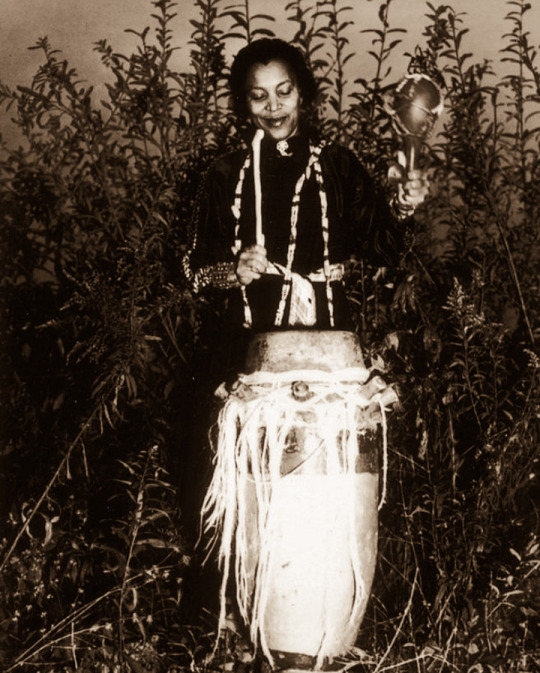
Novelist, Anthropologist, Folklorist, Scholar, Vodou initiate & Historian, Zora Neale Hurston's legacy is forever cemented in Hoodoo Culture (and beyond) as the masterful wordsmith who cast a shining light on black excellence in all everyday forms/spaces, our ATR roots, & the preservation of Black Voices during the prime of the Harlem Renaissance.
Auntie Zora was born in Notasulga, AL and raised on 5 acres of land in Eatonville, FL by her preacher-father and free-spirited mother ; in what would be the first all-Black township in the country. After the shattering loss of her mother, Zora turned up in Baltimore, MD where she presented herself as a 16 year old (10 years her junior) in order to access free public school education resources; thereby finishing school. From then on, Zora lived her life presenting herself as 10 years younger than she actually was. She'd go on to graduate from Barnard College in 1928.
She published several novellas & articles, including "Mules & Men"; a collection of Hoodoo Folklore. She entered the zenith of her career in the late 30s/40s after publishing her masterworks: "Their Eyes Were Watching God", "Tell My Horse", "Moses, Man of the Mountain", & an anthropological study on Hatian Vodou .After publishing her autobiography, "Dust Tracks on a Road, "Auntie Zora finally received the public recognition & literary respect that was long overdue. Despite her successes, and unprecedented contributions in classic literature & anthropology, Zora never received the financial contributions that her work so deserved.
Zora Neale Hurston passed away; penniless, alone, & drifting into obscurity. Friends and supporters from near and far raised $600 for her funeral service and burial. She was buried in an unmarked grave, in a segregated section, at the Garden Of Heavenly Peace Cemetery in Fort Pierce, FL. Over a decade later, in 1973 the Great Alice Walker found the unmarked grave and ordered a headstone to be placed on it; engraved with, "Genius Of The South" in Zora's honor. It remains in place today. “Let no Negro celebrity, no matter what financial condition they might be in at death, lie in inconspicuous forgetfulness. We must assume the responsibility of their graves being known and honored.” - Zora Neale Hurston to W.E.B. Dubois Auntie Zora wanted to be remembered & demanded that the same honor and respect be given unto her peers & others. Never forget the infectious voice that defined & defied, inspired & struck fear in many hearts of her time & after. We pour libations & give��💐 today as we celebrate Auntie Zora for her enigmatic spirit, ancestral wisdom, labor of love for Hoodoo Folklore, & for the seeing the beauty in the dark, sometimes solemn, corners in Black Culture. Let her studies continue to inform our own. Let her spark a fire in us to reconnect to our roots & grow within our lineages.
Offering suggestions: money, music, read/share her work, libations of water, & flowers.
‼️Note: offering suggestions are just that & strictly for veneration purposes only. Never attempt to conjure up any spirit or entity without proper divination/Mediumship counsel.‼️
#hoodoo Saints#Hoodoo Saint#zora neale hurston#Hoodoo#vodou#haitian vodou#the hoodoo calendar#hoodoohistory#hoodoos#atrs#atr#hoodoo culture#bvm#Hoodoo Folklore#Black authors#Black writers#own voices#Black Power
717 notes
·
View notes
Text
THIS DAY IN GAY HISTORY
based on: The White Crane Institute's 'Gay Wisdom', Gay Birthdays, Gay For Today, Famous GLBT, glbt-Gay Encylopedia, Today in Gay History, Wikipedia, and more … November 26


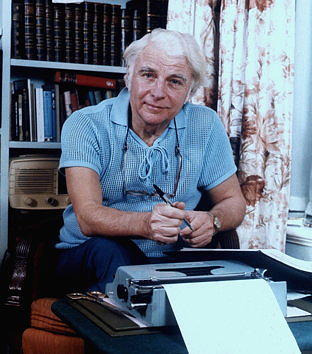
1905 – Emlyn Williams, Welsh actor born (d.1987). He was born into a Welsh-speaking, working class family in Mostyn, Flintshire. Aged 11 he won a scholarship to Holywell Grammar School. At the end of his time at the grammar school he won a scholarship to Christ Church, Oxford and joined the Oxford University Dramatic Society (OUDS)
In 1927, He joined a repertory company and began his stage career. By 1930, he had branched out into writing, and his first major success was with the thriller Night Must Fall (1935), which was made into a film in 1937 and again in 1964. His other great play was very different: The Corn is Green (1938), partly based on his own childhood, and also later filmed. In addition to stage plays, Williams wrote a number of film screenplays, working with Alfred Hitchcock and other directors.
He acted in and contributed dialogue to various films based on the novels of A.J. Cronin, including The Citadel (1938), The Stars Look Down (1940), Hatter's Castle (1942), and Web of Evidence (1959). In 1941 Williams starred in the film You Will Remember, based on the life of the popular late Victorian songwriter Leslie Stuart, played by Robert Morley, with Williams as Stuart's best friend.
Williams often appeared in his own plays, and was famous for his one-man-shows, with which he toured the world, playing Charles Dickens in an evening of excerpts from Dickens' novels. This "one man show" was the start of a whole new theatrical genre. He followed up his Dickens performance with one man shows based on the works of Dylan Thomas, Dylan Thomas Growing Up, and H.H. Munro better known under his pseudonym Saki.
Williams' autobiography, in the volumes George (1961) and Emlyn (1973), was also highly successful. In both books, he wrote frankly of his homosexual experiences; indeed, he was publicly "out" as a bisexual before other better-known gay literary celebrities, such as his close friend and contemporary Christopher Isherwood. In Emlyn he recounts the story of his love affair with an actor on the skids. It is beautifully told and considering that Williams was a married man with children when he wrote it, is boldly courageous in its honesty. He also describes his Gay life in New York in the 1920s, including a rather hilarious scene at the Everard Baths regarding someone's false teeth coming loose in an act of fellatio. Despite his homosexuality, as many gay men of his generation did, as has already been said, he had married in 1935 and had a son; his wife died in 1970.

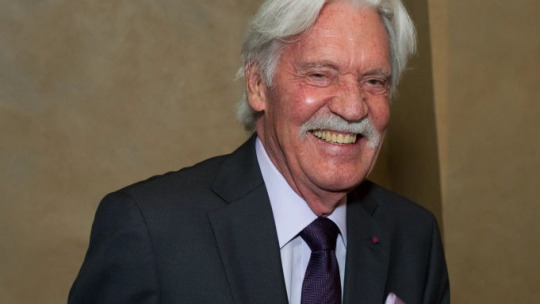
1926 – Michael Butler (d.2022) was an American theatrical producer born on this date; he is best known for bringing the rock musical Hair from the Public Theater to Broadway in 1968. During his time as Hair producer he was dubbed by the press as "the hippie millionaire". Other Broadway production credits include the play Lenny in 1971 and the musical Reggae in 1980.
Butler was born in Chicago, Illinois into a wealthy family. In the early 19th century, his ancestors started a paper company on the Fox River in St. Charles, Illinois, and supplied paper for the U.S. Congress. The business was later moved to Chicago, where it was at one time one of the city's oldest family owned business, and later diversified into dairy, ranching, aviation. Butler's father helped found the village of Oak Brook, Illinois and the Oak Brook Polo Club.
Butler served as Special Advisor to then-Senator John F. Kennedy on the Middle East, Chancellor of the Lincoln Academy, Commissioner of the Port of Chicago, President of the Organization of Economic Development in Illinois, Assistant to Illinois Governor Otto Kerner, Jr., President of the Illinois Sports Council, and he was a Democratic Candidate in Du Page County for the State Senate.
Butler was the godson of Tyrone Power, and in his early twenties he lived with Power and his wife, actress Linda Christian. Rumour has it he had affair with both of them. He was also involved with Rock Hudson. Through Power's friend, film director Edmund Goulding, he befriended the Kennedy family, particularly Joe and John F. Kennedy. Butler and JFK socialized often in Hyannisport, Greenwich Village and in Newport, R.I.
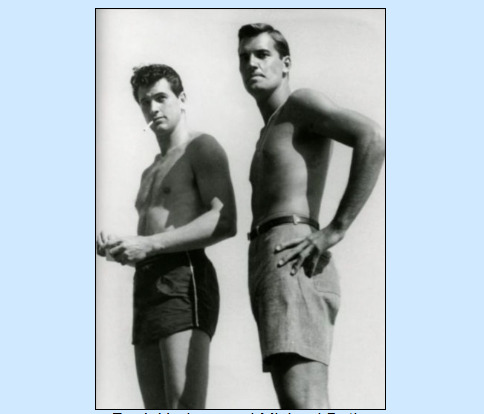
Rock Hudson and Michael Butler
Butler dated Candice Bergen, Nati Abascal and Audrey Hepburn, with whom he had a relationship in the early 1950s before her marriage to Mel Ferrer. Butler was involved in Hepburn accepting a role in the New York production of the play Ondine, where she worked with Ferrer soon before marrying him. He has a son, Adam, from his 1962 marriage to Loyce Stinson Hand.
Around the time of his first association with Hair, Butler became a political activist. Before the 1968 Democratic National Convention in Chicago he arranged a meeting between Chicago mayor Richard Daley and Abbie Hoffman, recommending that the party cultivate the Yippie vote. He held "Cause" meetings in Oak Brook, Illinois in the summer of 1969 with Tom Smothers, Peter Yarrow, and Black Panther Fred Hampton, among others. Butler donated hundreds of thousands of dollars to left-leaning causes and was listed on Richard Nixon's Enemies List.

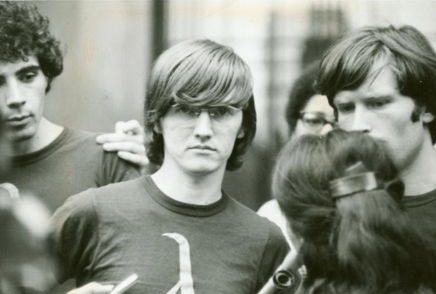
1947 – Jim Owles (d.1993) was the founding president of the Gay Activists Alliance and the first openly gay candidate for political office in New York City.
James W. Owles was born in Calumet City, Ill. He attended the University of Illinois and then served in the Air Force.
In December 1969, he helped found the Gay Activists Alliance in New York City with Arthur Bell, Martin Robinson and others. As president of the alliance from 1970 to 1971, Mr. Owles advocated anti-discrimination bills in Albany and New York City.
"We do not ask for any respectability or sympathy from straight people," he declared in a letter to the State Legislature in February 1971. Others' opinions, he said, "are of no interest to us except to the extent that these private bigotries are allowed to become public policy."
In 1971, on the eve of the second annual gay pride march, Mr. Owles said: "It's a lot more difficult to march out of the closet than to march for peace. It can cost you your job or your career." He envisioned a future in which homosexuals would "show straights and themselves that being gay means something more than the baths and the bars," and he said he expected to work for gay rights "till I die."
During demonstrations, known as "zaps," mounted by the alliance, Owles was arrested many times. In April 1972, at the annual Inner Circle dinner of City Hall reporters at the New York Hilton, Mr. Owles grabbed the microphone onstage to denounce press coverage, and a melee erupted in which he and Morty Manford were seriously injured.
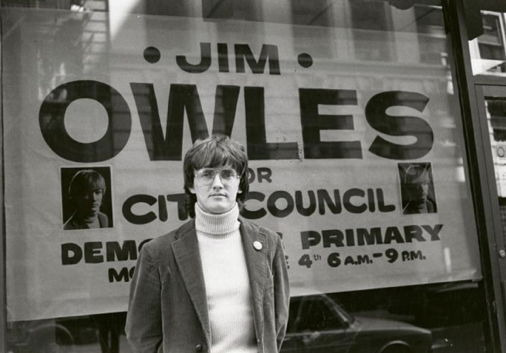
In January 1973, Mr. Owles declared his candidacy for the City Council district encompassing Greenwich Village, which he called the nation's "largest gay ghetto." He described himself as the first openly gay candidate for office in New York City.
Although he failed in his bid for council, Owles went on to be a founder of the Gay and Lesbian Independent Democrats in 1974, the first such political club in the city. In 1985, he was one of the seven founding members of the Gay and Lesbian Alliance Against Defamation, which monitors the coverage and depiction of lesbians and gay men in the media.
Until illness forced him to step down in 1993, Jim Owles was a special assistant and liaison to the lesbian and gay community for the State Senate minority leader, Manfred Ohrenstein. He had worked for the Senator, a Manhattan Democrat, since the early 1980's.
He died in 1993. The cause was AIDS-related toxoplasmosis.


1957 – The Cuban-born artist Felix Gonzalez-Torres was born (d.1996). He grew up in Puerto Rico before moving to New York City. Gonzalez-Torres had his first one-man exhibition at Andrea Rosen Gallery in 1990. His work was the focus of several major museum solo exhibitions in his lifetime and after his death. Retrospectives of his work have been organized by the Solomon R. Guggenheim Museum in New York (1995), the Sprengel Museum in Hannover, Germany (1997), and the Serpentine Gallery in London (2000).
Gonzalez-Torres was known for his quiet, minimal installations and sculptures. Using materials such as strings of lightbulbs, clocks, stacks of paper, or packaged hard candies, Felix Gonzalez-Torres's work is sometimes considered a reflection of his experience with AIDS.
Many of Gonzalez-Torres's installations invite the viewer to take a piece of the work with them: a series of works allow viewers to take packaged candies from a pile in the corner of an exhibition space, while another series is comprised of stacks of ultrathin sheets of clear plastic or unlimited edition prints, also free for the viewer to take. These installations are replenished by the exhibitor as they diminish. The most pervasive reading of Gonzalez-Torres's work takes the processes his works undergo (lightbulbs expiring, piles of candies dispersing, etc.) as metaphor for the process of dying.

"Untitled"
One of his most recognizable works, Untitled (1992) is a billboard put up in New York City of a a sensual black-and-white photograph of Gonzalez-Torres's empty, unmade bed with traces of two absent bodies. It was installed on twenty-four billboards throughout New York. This enigmatic image was both a celebration of coupling and a memorial to the artist's lover, Ross, who had recently died of AIDS. In one interview, he said "When people ask me, 'Who is your public?' I say honestly, without skipping a beat, 'Ross.' The public was Ross. The rest of the people just come to the work."

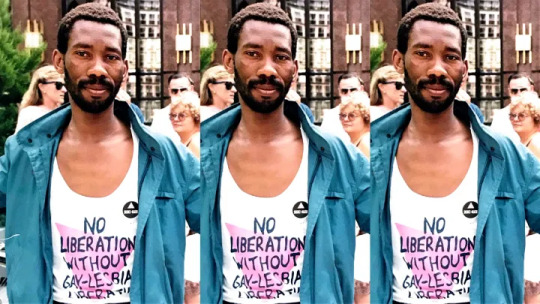
1957 – Simon Nkoli (d.1998) was an anti-apartheid, gay rights and AIDS activist in South Africa.
Nkoli was born in Soweto in a seSotho-speaking family. He grew up on a farm in the Free State and his family later moved to Sebokeng. Nkoli became a youth activist against apartheid, with the Congress of South African Students (COSAS) and with the United Democratic Front.
In 1983, he joined the mainly white Gay Association of South Africa, then he formed the Saturday Group, the first black gay group in Africa.
Nkoli spoke at rallies in support of rent-boycotts in the Vaal townships and in 1984 he was arrested and faced the death penalty for treason with twenty-one other political leaders in the Delmas Treason Trial, including Popo Molefe and Patrick Lekota, collectively known as the Delmas 22. By coming out while a prisoner, he helped change the attitude of the African National Congress to gay rights. He was acquitted and released from prison in 1988.
He founded the Gay and Lesbian Organisation of the Witwatersrand in 1988. He traveled widely and was given several human rights awards in Europe and North America. He was a member of International Lesbian and Gay Association board, representing the African region.
He was one of the first gay activists to meet with President Nelson Mandela in 1994. He helped in the campaign for the inclusion of protection from discrimination in the Bill of Rights in the 1994 South African constitution and for the repeal of the sodomy law, which happened in May 1998 in his last months.
After becoming one of the first publicly HIV-positive African gay men, he initiated the Positive African Men group based in central Johannesburg. He had been infected with HIV for around 12 years, and had been seriously ill, on and off, for the last four. He died of AIDS in 1998 in Johannesburg.


1973 – Jonathan Caouette is an American film director, writer, editor and actor.
Caouette is the director and editor of Tarnation (2003), an autobiographical documentary, that premiered at the Sundance and Cannes film festivals in 2003 and the director of All Tomorrow's Parties about the cult music festival. Caouette has also directed the experimental short film All Flowers in Time and the feature documentary Walk Away Renee. The latter was produced by Agnes B and premiered at the 2011 Cannes Film Festival. In 2009, Caouette served as a creative advisor for director Matthew Mishory's film, Delphinium: A Childhood Portrait of Derek Jarman.
As an actor, Caouette played a major role in the 2006 film Fat Girls and the film Portland in 2012. He also appeared in Shortbus, directed by John Cameron Mitchell.
Caouette has a son, Josh, who was featured in the 2008 documentary Bi the Way. Caouette is gay and lives with his husband David in New York City.


1983 – Today, one of the inventors of Facebook and Obama's tech wizard Chris Hughes was born. Hughes co-founded and served as spokesperson for the online social directory, Facebook, with Harvard roommates Mark Zuckerberg and Dustin Moskovitz. Hughes currently serves as a consultant for the popular site, but primarily acts as coordinator of online organizing within the Barack Obama presidential campaign on My.BarackObama.com, the campaign's online social networking website. He also served on the National Board of Directors of the Roosevelt Institution in 2005 and 2006.
Chris Hughes was born in Hickory, North Carolina, a small, conservative town in the western part of the state. Not entirely comfortable in his hometown, he longed to go away to prep school. Given his family's modest income, achieving that dream seemed unlikely; nevertheless, as a high school freshman Hughes, unbeknownst to his parents, applied to a number of boarding schools. The prestigious Phillips Academy in Andover, Massachusetts not only accepted him but also offered financial aid that would allow him to attend.
While he was at Phillips, Hughes recognized that he was gay. "I went to boarding school Southern, religious, and straight, and I left boarding school not being at all religious and not being straight," he stated to Ellen McGirt of Fast Company.
During his sophomore year he roomed with Mark Zuckerberg, a student who was working with another dorm-mate, Dustin Moskovitz, to create an on-line version of Harvard's "facebook," a publication with photos and basic information about students to help them meet each other. Zuckerberg invited Hughes to join the project.
Zuckerberg and Moskovitz were computer geeks proficient in the technical aspects of the process, such as writing software codes. Hughes's emphasis was on the users: how they would want to connect with others, how they could share information, how their concerns about privacy could be addressed.
Hughes's input earned him the nickname "the Empath"—perhaps slightly derisive among die-hard techies but also reflective of what would be his crucial role in the development of Facebook.
In the summer of 2004 Hughes, Zuckerberg, and Moskovitz went to California, seeking venture capital for the fledgling Facebook site. The rest is history.
He is the Executive Director of Jumo, which he founded in 2010. Jumo is a non-profit social network organization which "aims to help people find ways to help the world." In July 2010, UNAIDS (Joint United Nations Programme on HIV/AIDS) appointed him to a 17-member "High Level Commission" of renowned politicians, business leaders, human rights activists, and scientists tasked with spearheading a "social and political action campaign over the coming year aimed at galvanizing support for effective HIV prevention programmes".
In 2009, Hughs attended President Obama's first state dinner with his boyfriend Sean Eldridge, Political Director of Freedom to Marry. On New Year's Eve 2010, on a vacation trip to Thailand, he became engaged to Sean, his partner of five years. Hughes and Eldridge announced their engagement in January 2011 at a reception in support of Freedom to Marry. He and Eldridge have lent their own voices and resources to the cause of glbtq rights, particularly marriage equality.


2015 – In Bolivia, the Justice Minister announces the passage of the Law of Gender Identity which allows transgender people to change their legal documents. The bill was initially proposed by Raysa Torriani, a transgender woman and trans activist, three years earlier. The “Law of Gender Identity” will legally recognize the identity of 1,500 self-identified transgender people living in Bolivia . "Now, the sisters and brothers who want to change their name and sex, by an administrative resolution, can change their information" in the records of various government institutions, said Virginia Velasco, the minister of justice of Bolivia.


8 notes
·
View notes
Text
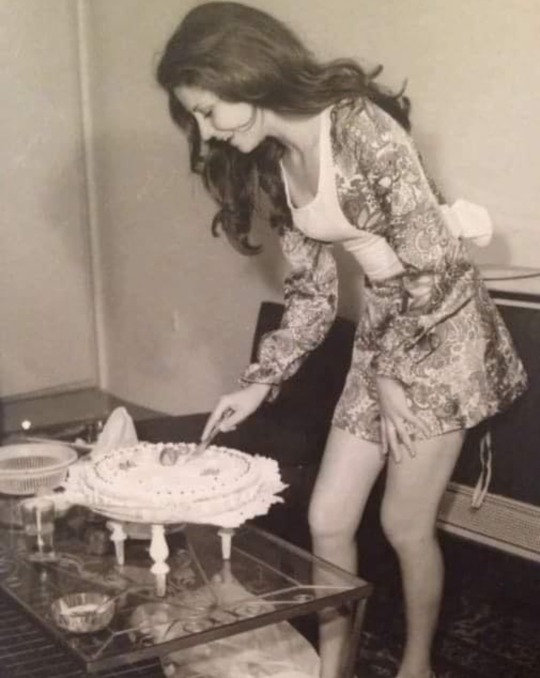
This was Iran, circa 1973. A woman cutting her birthday cake.
This is a snapshot of Iran when it was one of the most open and progressive countries in the region, if not the world.
Just 6 years later, Iran was given (yes given, by the Western powers such as France and the U.S.) to unelected pedophile mullahs.
These mullahs have not only repressed any and all dissent, but they are murdering thousands of people all over the world, having successfully positioned Jihadi armies in over 100 countries.
Today, the Iranian Mullahs (who overtly and openly advocate murdering large swaths of others in the service of their cult), are using the Palestinians as a cudgel to attack Israel and genocide the Jews. But tomorrow, all of you reading this (except Islamists who support them, of which there are many on Tumblr), are next. Not only Jews and Christians, but any Muslim who refuses to practice Islam as it existed in the medieval 7th century.
Iran or Islamists in general, could care less about the Palestinians let alone anyone but themselves and their nightmare of a Caliphate enveloping the globe.
What you are seeing play out in Israel is merely a microcosm of what is coming to England, France, Germany, Belgium, Sweden, the U.S.,Canada, South America, Indonesia, Malaysia, and the rest of Asia, for starters.

This picture is also pre-1979 Iran, where more women attended university and sought advanced degrees than men. Notice the difference between real clothing and repressive black tents.
#secular-jew#israel#jewish#judaism#israeli#jerusalem#diaspora#secular jew#secularjew#islam#caliphate#Iran#mullahs#islamic jihad#islamism#Hezbollah#hizbollah#free iran#mullah#antisemitism#hamas#iranian#ayatollah khamenei#ayatollah#Persia#judea#tel aviv#samaria#vieformidable#gaza
24 notes
·
View notes
Text
WIP Wednesday

Tagged by the lovely @piratefalls and @onthewaytosomewhere
Happy birthday to our favorite chaos bisexual baby boi, Alex! I am almost at the finished line for this chapter. I'm determined to post today, so stay tuned, folks. Wordy little bastard Alex has a lot to say and a lot of FEELS. ENJOY!
As they exited the cemetery, Henry turned to him and asked, “Would you indulge me one more cemetery tour?” Alex nodded, something in Henry’s eyes telling him this was important. They walked down the street until they found an appropriate place to cross. Henry led them up to the open gate that read Holt Cemetery. Compared to the grandeur of the place they just left, Holt looked rundown and neglected. The gravestones were worn and crooked, some lined with PVC pipe or broken mini-picket fences, and decorated with mementos from loved ones. He took Henry’s hand and squeezed it as they walked along the gravel drive. “Somewhere in here,” Henry said softly, “may lie the remains of four men, victims of a gay bar fire in 1973 called the Upstairs Lounge.” “May?” Henry’s jaw tightened. “Many older records were destroyed after Katrina. Some say the victims, one, possibly two, who have been identified, were buried here or in the Charity Hospital Cemetery nearby. Their bodies were so damaged, they were never identified or claimed. One man’s family, Ferris LeBlanc, didn’t even know he’d died in the fire until 2015. In total, thirty-two men died that night, the deadliest attack on a queer space until Pulse in Orlando.” “Jesus fucking Christ,” Alex hissed. “Was anyone ever charged?” Henry shook his head. “There was a suspect, a man who had been ejected about twenty minutes before the fire started, but it ultimately went nowhere. It was just a bunch of queers who had it coming, right?” “How did you learn about this?” “A documentary,” Henry replied. They paused, and Henry held their joined hands against his chest. “I have a vested interest in the history of our community because the mainstream media and so-called educators still seek to bury it.” Alex swallowed thickly as he scanned the cemetery. As the son of a Mexican immigrant, he knew all too well how hard the system fought to suppress those they deemed as “other.” It occurred to him that so much of the real history of this country hadn’t been taught to him in the classroom but through books, documentaries, and people like Henry. People determined not to let their history fade into obscurity. “I don’t mean to preach-” Alex stopped him. “No, you’re not. And you’re right. These men deserve to be remembered. Thank you for sharing this with me. I’ve only been for about a year, and I’ve still got so much more I need to learn.” “That’s the first step,” Henry smiled. “The worst thing you can do as a young queer person is live in willful ignorance because the people in power are counting on it. Pride Month is about so much more than celebrating who we are. It’s about remembering those who we’ve lost, who didn’t get the chance to live openly as we do now.” Alex felt a lump growing in his throat. He wrapped his arms around Henry and squeezed tight. Henry huffed a laugh but returned his embrace, murmuring, “I’d kiss you right now, but that would be grossly inappropriate, given our current location.” “Good call.”
There are so many bonding moments between A&H in this chapter, but this is one I'm proud of. As a queer person myself, Henry was channeling me as I too think it is beyond vital that queer people learn their history, the bad and the good. Celebrate Pride but remember the people who are no longer here. CMQ brought up the story of the Upstairs Lounge in One Last Stop, so I wanted to include it here as I feel it would be something important that Henry would want to share with Alex. I promise, this chapter is almost done and you guys are NOT ready for it! All aboard the hype train, choo chooooooo! See ya soon!
12 notes
·
View notes
Text

SAMA ALI ( AIYSHA HART ) is a THIRTY-TWO year-old UN POLITICAL AFFAIRS OFFICER in GENEVA, SWITZERLAND. They were brought under Richard’s care when they were only THIRTEEN years old. They are known as THE AMBITIOUS because they are STRATEGIC but also COMPETITIVE. Let’s see what choice they make regarding the fate of Woodrow House.
BASIC INFORMATION
Full Name: Sama Ali Nickname(s): n/a, call her Sam at your own risk Date of Birth: born 1972, exact date of birth unknown; birthday celebrated October 30 Age: 32 Occupation: Political Affairs Officer for the United Nations Current Residence: Sama has a small apartment in Geneva. She’s traded space for convenience, opting for a 290 square foot flat within easy walking distance of work. Her job does require her to travel frequently and occasionally for extended periods of time, but Geneva is her home base.
PHYSICAL APPEARANCE
Hair: black; worn straight and more or less shoulder length, depending on how long it’s been since she got it cut Eyes: dark brown Height: 5’9” Notable Features: high cheekbones, arched eyebrows, sharp jaw
PERSONALITY & BEHAVIOR:
Strengths: strategic, assertive, determined, pragmatic, resilient Weaknesses: competitive, single-minded, reticent, show-off, insensitive (especially when it comes to other people’s feelings) Quirks: ⬧ Sama has a bad habit of checking her watch when she’s bored or frustrated, and she’s never without it, or her Blackberry. ⬧ She walks very quickly, for no reason other than to get to where she’s going that much faster. ⬧ She will also speak for others, especially people she knows well, if she feels like they’re not answering quickly enough, or if they pause and seem to be searching for words. ⬧ Her default stance when standing is her feet in third position and her hands resting on one hip, muscle memory left over from her years of ballet. ⬧ Sama hates going barefoot, and usually will wear a pair of ballet slippers instead of shoes when indoors. Vices: ⬧ Card games; not for gambling, she generally dislikes games of chance, but more for the thrill of winning. ⬧ Dance movies; they take her back, whether they feature ballet or not, and Dirty Dancing is actually the romantic ideal. ⬧ Suppressing emotions; Sama would probably cease to function if she was ever forced to actually look at all the feelings she ignores. ⬧ Whipped cream; not necessarily a vice, but it is Sama’s favorite treat.
INTEREST & HOBBIES:
Interests: Poetry, feminism, global politics, ballet, the wives of famous/powerful men(think Eleanor Roosevelt, Vera Nabokov, Catherine of Aragon), The West Wing (an American political drama that she still keeps up with). Hobbies: Sama doesn’t have much time for hobbies these days, she prefers to keep herself busy with work. One hobby, which is almost a habit, that she keeps up is journaling. As a child, she journaled religiously, making sure to keep a detailed account of her life so she could update her parents when they came back for her. While she’s long since let go of that childish dream, she still journals frequently. As a result, Sama is a pen snob. Special Skills/Talents: ⬧ Sama is a polyglot; fluent in English, Arabic, French, Persian, and (Swiss) German, as well as having some conversational Italian; she is also currently learning Mandarin. ⬧ She taught herself calligraphy in high school, one of many attempts to connect with her heritage, and still practices enough to keep her skills sharp. ⬧ She has an admirable talent for landing on her feet, for making the best of a bad situation or snatching victory from the jaws of defeat. Some may call Sama lucky, but to do so would discount all the work she puts into getting what she wants.
BECOMING A WARD
Sama is one of Richard’s most famous ward, not that anyone outside of herself, Richard, and Mrs. Tristan ever knew that. In October of 1973, there was quite a stir over a baby found in Grand Central Station, initially assumed to be lost until it became clear she’d been abandoned on purpose. With no identifying information other than a name pinned to the back of her jacket, the authorities were unable to find her parents and Sama was ultimately shuffled into foster care. Think pieces and op eds will still occasionally surface about the Grand Central Girl, which Sama has a morbid fascination with. What is common knowledge in Woodrow House is this; in 1986, an essay about the foster system was submitted to Kingsbury College’s annual writing contest, and it caught Richard’s attention to the extent that he just had to meet its author. He loved telling the story of his shock and delight on discovering that the essay had been written by a 13 year old girl, despite the fact that Sama insisted she never forgave him for the discovery that disqualified her from the contest. Over the course of a summer the two kept in touch, and letters turned into phone calls and eventually became face to face meetings. It didn’t take long for Richard to decide to take Sama on as his ward, but convincing Sama to accept his offer was another matter. By the time she met Richard Woodrow, Sama had long since learned that things that seem too good to be true usually are. Like the foster mother who told Sama she was never going to adopt but that she’d keep her until she graduated from high school, only to adopt a different child 14 months later, dumping Sama in the process. The temptations of Woodrow House were almost too much for a girl to resist, Sama had never had her own room nor access to private tutors in whatever subject her heart desired, but this was exactly what made her skeptical. Ultimately she decided it was too great an opportunity to pass by and, with the condition of continued access to her social worker, Sama agreed.
LIFE AS A WARD
To say that Sama was prickly when she first arrived at Woodrow House would be an understatement. From the first day she was all sharp edges. She cursed too much, a habit that she eventually eliminated under Mrs. Tristan’s example, and she seemed to have a perpetual glare, an expression that only softened some rather than completely. It was her seventh foster home, so by the time she got there, she knew how to carve out a space for herself, and how to defend it. She decided at an early age that she was never going to be anyone’s whipping girl, and she came on a little strong initially. Even when she realized that Woodrow House was not a typical foster home, she was still assertive, and sometimes too assertive, about her right to be there and her authority over her own space. While she mellowed with time, she was never a warm and fuzzy person, and she never wanted to be a sister-figure. By the time Sama arrived at Woodrow House, she was already the ambitious one, already driven, already striving, already putting herself out there in order to prove… something. Even at thirteen she was the one with big, big plans to become a household name, although she never told anyone why. She was always busy, always doing something, never making time to really build meaningful relationships. Which is not to say she was anti-social, but she was selective. She would crash someone’s private tutoring, or try out another ward’s latest extra-curricular. She learned who had similar goals or preferences to her and who didn’t. She loved learning new things and honing her skills, and she appreciated people who could help her to those ends. The roles Sama played in Woodrow House were simple. She firmly established herself as one of the older wards, usually holding herself above the younger ones. She was a favorite, of both Richard and Mrs. Tristan. She wasn’t afraid to use that to get what she wanted when the occasion called for it, but she also maintained that the reason she was a favorite was because she never asked for too much. She remained generally a loner, seeming to occasionally grace certain wards with her presence more than seek out anyone’s company.
AESTHETIC
Sama’s style icon is CJ Cregg, from the American political drama The West Wing. She’s a big fan of power suits and loose blouses, and prioritizes high quality, classic styles over seasonal trends. She eschews many of the moment Y2K styles in favor of the designs from her twenties, maintaining a sleek and minimalist wardrobe. A businesswoman to her core, her version of dressing down is a sweater set and slacks. She favors neutrals and darker colors, and generally avoids prints. She likes headbands and still wears scrunchies when she’s having a rare casual moment. She has a modest collection of subtle stud earrings that she rotates in her single lobe piercings, and are the only jewelry she regularly wears.
EDUCATION
As soon as it was permitted, Sama chose to attend a prestigious, and private, all girls’ school that she knew about from having a former foster home nearby. It appealed to her because it was prestigious, because it was an all girls’ school—the pre-teen misandry stayed strong in her—and because none of the other wards already at Woodrow House attended it. Once there she made rather more enemies than friends, but at least she made them on her own and as herself, not part of a set. She was quickly identified as a teacher’s pet and know-it-all, because the purpose of school for Sama was to learn and climb to the top of her class. However, any classmates who tried to bully her quickly learned that she was more than capable of standing up for herself. When she graduated, her valedictorian speech brought many of the parents in the crowd to tears, but most of their daughters rolled their eyes. For college, Sama set her sights on Columbia University from a young age, and not even Richard’s fondness for his own alma mater could dissuade her. Just like high school, she wanted to attend college on her own terms, and not as one of Richard Woodrow’s charity cases. At Columbia, she double majored in Human Rights and Women’s Studies, ultimately graduating Summa Cum Laude and at the top of her class. More importantly, she learned how to network with her peers instead of alienating them, and still has connections, some might even say friends, from undergrad to this day. Sama welcomed Richard’s offer to pay for her undergraduate work, but when she was ready for grad school, she insisted on taking care of it herself, even though she didn’t have to. She covered her law school with a combination of grants, scholarships, some student loans, and the savings she built up with her allowance from Richard as a ward. Her last step in formal education was a degree in International and Comparative Law from Georgetown. She was accepted to other schools that were arguably more prestigious, like NYU and Yale, but decided that a school in the nation’s capital would align best with her long term goals.
EXTRACURRICULARS
Ballet, tennis, debate, school newspaper, volunteering. Sama dabbled in all sorts of extra-curriculars during her years at Woodrow House, but only a few were truly hers. Ballet was an interest that started before Richard came into Sama’s life, but her multiplicity of foster homes before Woodrow House made it difficult for her to truly commit to it, so Richard arranged for her to take private lessons in order to catch up with other dancers her age. The precision and structure of ballet appealed to Sama, as well as the fact that it was a challenge. Tennis was something she did because Alison did it, which is to say that she liked having an opponent who was as competitive as she was, and that she liked being around Alison. Debate and school newspaper were both things that looked good on her college resume, but she enjoyed them, as well, especially when she was made editor of the newspaper her senior year. Volunteering was something that Sama did ostensibly for the same reason she did debate and school newspaper, but the truth was she wanted to give back. She felt like she needed to use her privilege as a Woodrow ward not just to better herself, but others as well.
THEIR LIFE NOW
After graduating from Georgetown, Sama didn’t pursue a legal career; that had never been the goal. Instead, she got a job at the United Nations headquarters in New York City, where she began steadily working her way up through the ranks of the political affairs department. She quickly established a name for herself as a driven employee and a creative problem solver, but also someone who cared deeply about the work the organization was doing. She jumped at any chance to travel for work that was presented to her and never balked at the long hours her job required. Through it all, she never went back to Woodrow House, despite it being relatively close. There was always some sort of excuse, and it always boiled down to she was just too busy. She refused to admit that there could be anything else keeping her away. She didn’t go out of her way to keep in touch with her fellow wards, but if any of them were willing to put in most of the work, she wouldn’t ice them out, with one obvious exception. It was always uncomfortable for Sama to know that Alison was out there, in the same city as her, knowing that they might just run into each other one day, but she didn’t want to be run out of town, not again. Following 9/11, it became clear that her skin color would be a detriment to Sama’s plans, and in 2002, she transferred to Geneva, wanting some distance from the rising Islamophobia in the US. She likes to think she’s settled into Geneva admirably, even though it was a rough transition initially, and she prefers it to New York in some ways. She remains married to her work, pursuing her goals with the same single-minded fervor that prevented her from getting more attached to her fellow wards as a teenager. Work-life balance is not a concept that Sama has any interest in and, after one situationship with a coworker that ended very messily, the only thing Sama keeps separate from work is her romantic life. Not that there’s much romance in her life, Sama doesn’t really date so much as she has habitual hookups, always strictly feelings-free until someone, usually the other person, drops the ball. Whenever feelings start to get involved, Sama’s mandate is to leave before she gets left. You’d have to have her at gunpoint to get her to admit that she’s lonely, or that all of her achievements are starting to feel empty, but she’s been fighting for the approval of the parents who didn’t want her for so long, she doesn’t know how to do anything else.
TIMELINE
1972: Sama is born, probably sometime in the spring.
1973: Sama is found abandoned in Grand Central Station in New York City on October 30th. She is placed in her first foster home in early November.
1974: Sama is officially made a ward of the state when the case to find her parents is closed.
1986: Sama anonymously submits an essay about the foster system to the Kingsbury College writing contest, of which Richard is a faculty judge, in the spring. Sama and Richard meet and get to know each other over the summer. She moves into Woodrow House as Richard’s ward in late August.
1987: Sama begins her freshman year at a private girls’ school in the fall.
1991: Sama graduates from high school in the spring. She begins her first year at Columbia University in the fall, never returning to Woodrow House.
1995: Sama graduates from Columbia in the spring. She begins her first year at Georgetown Law in the fall.
1998: Sama graduates from Georgetown Law in the spring. She begins working at the UN headquarters in New York City over the summer.
2002: Sama takes a job at the Geneva branch of the UN.
2005: Sama receives the news of Richard’s passing and returns to Woodrow House.
8 notes
·
View notes
Text

Happy Birthday to Ann-Margret who turns 83 today!
83-Year-Old Ann-Margret Refuses To Give Up Her Harley.
Ann-Margret has a long list of prestigious accolades, but she's just a biker at heart.
Photo: Ann-Margret cruising on a chopper in 1971
Ann-Margret Olsson (born April 28, 1941), credited as Ann-Margret, is a Swedish-American actress and singer. She has won five Golden Globe Awards and been nominated for two Academy Awards, two Grammy Awards, a Screen Actors Guild Award, and six Emmy Awards, winning in 2010 for a guest role in Law & Order: Special Victims Unit.
She is known for her roles in Pocketful of Miracles (1961), State Fair (1962), Bye Bye Birdie (1963), Viva Las Vegas (1964), The Cincinnati Kid (1965), Carnal Knowledge (1971), The Train Robbers (1973), Tommy (1975), Magic (1978), The Villain (1979), The Return of the Soldier (1982), Who Will Love My Children? (1983), 52 Pick-Up (1986), Newsies (1992), Grumpy Old Men (1993), Grumpier Old Men (1995), Any Given Sunday (1999), Taxi (2004), The Break-Up (2006) and Going in Style (2017).
Her singing and acting careers span seven decades, starting in 1961. Initially, she was billed as a female version of Elvis Presley. She has a sultry, vibrant contralto voice. She had a Top 20 hit song in 1961 and a charting album in 1964, and she scored a disco hit in 1979. She recorded a critically acclaimed gospel album in 2001 and an album of Christmas songs in 2004. In April 2023, she released her first rock album, Born to be Wild.
7 notes
·
View notes
Text


everything ends and that's the saddest thing i'll ever hear.
⸻ backstory. pinterest. musings. playlist.
quick stats
name: marlo dalton
gender: cis woman
pronouns: she/her
age: 34 ( thirty four )
dob: September 10th
pob: paxton, az
orientation: bisexual
affiliation: cowboy mafia
appearance
height: 5′ 6¼″ ( 1,68 m )
build: slim athletic
eye color: blue
hair color: copper-red
tattoos: horseshoe ( inner upper arm, left )
piercings: lobes ( both ), conch ( right ), helix (left)
personality
positive traits: driven, loyal, attentive, gregarious, quick-witted
negative traits: impulsive, relentless, restless, daring, explosive
summary: marlo is a wild girl who had to grow up in an instant. growing up at the rodeo with her father, she was used to an exciting and fast pace of life, seeking thrills from a young age. anything would do as long as it was exciting which often got her in trouble. in her teenage years, her relationships reflected that mindset. she had many friendships with different people from different backgrounds, always able to make them all work. however, her romantic relationships were rather short-lived, her focus remaining on the fun of it, never putting enough effort into her partners to make it work. her passion was always barrel racing and she gave it her all, thriving on the thrill and challenge it presented. things changed after her father's accident, forcing her to mature quickly. some people might consider marlo difficult, others challenging. she has a sharp tongue and quick mind, making her an entertaining friend or an adequate enemy. she values the people she cares about, her experiences and losses making her fiercely loyal and protective. even though she's become less hot-heated than her younger self, her emotions often still drive her to act impulsively, especially when she's backed into a corner or when she feels like she ran out of options.
career & education
current occupation: owner of horseshoe hospital
past occupation(s): barrel racer
education: doctor of veterinary medicine
significant relationships
vaughn dalton ( father / 1972 - alive but comatose ) : vaughn became a father at 18 and raised marlo in paxton with the help of his family. in his lifetime he became a accomplished bull rider. in 2011, at the age of 38 and towards the nearing end of his career, he had an accident during an event and suffered a brain bleed. he's been at an assisted living facility in phoenix ever since, with marlo visiting often. they were close and vaughn had a significant impact on marlo.
monica cooper ( mother / 1973 - alive ) : monica didn't want to be a mother and was willing to give marlo up after birth, moving to phoenix. their relationship was limited to birthdays and rare visitations. since vaughn's accident, monica has been visiting her ex and trying to upkeep a civil relationship with her daughter, although marlo is rather cold towards the woman.
rhett dalton (uncle / 1966 - 2023 ) : rhett was vaughn's older brother, the former owner of the horseshoe hospital and like a second father to marlo. he helped raise her and they were always close, although their bond became even tighter after vaughn's accident. rhett paid for her education and supported her growth at the clinic. his death broke marlo's heart and she's still grieving both men who raised her.
booker ( labrador / 2018 - alive ) : booker is an one-eyed rescue someone brought into the clinic. no owner ever showed up and marlo adopted him soon after.
skipper ( grey tabby cat / 2020 - alive ) : skipper was brought into the clinic by two tourists visiting from out of town. when marlo announced that the cat would have to get his front right leg amputated, the owners agreed but never picked him up after. marlo adopted him immediately, changing his name from ferdinant to skipper.
2 notes
·
View notes
Text
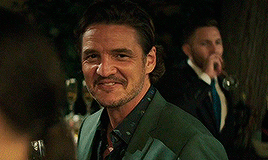
pedro pascal . 50. cismale. he/him. ┊┊ EMILIO GUTIERREZ, better known as agent CUPCAKE has been with cerberus corp as an eo since 2011 and is LEVEL III. A BAD BRAWL has gifted them DANGER DETECTION, though HE HAS TO BE NEARBY TO SENSE DANGER has also been noted. when they aren’t protecting the tri-state area, they are fond of RUNNING HIS FOOD TRUCK and are never seen without HIS GOLD CHAIN. civilians think they are FRIENDLY & OUTGOING, but some of the other agents see them as DISTRACTED & UNSERIOUS. cerberus corp should consider the fact that their last mission status was NOT COMPLETED BECAUSE HE DIDN'T SHOW UP when giving out the next one.
tw: death & violence .
001. GENERAL .
name emilio gutierrez nicknames em, emil, milo age 48 date of birth april 2nd, 1973 zodiac aries place of birth somewhere in new york current residence somewhere in new york gender cis male pronouns he/him sexuality unspecified occupation security guard/food truck owner
faceclaim pedro pascal height 5’11 tattoos none piercings none distinguishing features being extra handsome
positive traits friendly, outgoing, loyal & straightforward negative traits distracted, unorganized & unserious labels / tropes tbd likes food, relaxing car drives, taking naps in his food truck, spending quality time with others dislikes going to missions fears dying for real hobbies running his food truck (that doesn't actually sell cupcakes) habits misplacing his reading glasses, always rambling especially in stressful situations, constantly clearing his throat, clenching his jaw and scratching his face
002. EXTRA ORDINARY .
near death experience… emilio didn’t grow up in the greatest neighborhood. it was definitely a low income community and his parents had too many kids to keep track of. he quickly found himself running with the wrong crowd of people and started to find himself in more and more trouble as the days passed. after one particular outing with his friends not long after his fifteenth birthday, they ended up fighting a group of men much older than they were. none of them really stood a chance against these men and it was only over something as dumb as one of his friends took their son’s bike. the fight seemed to last forever and once emilio fell to the ground, the beating didn’t stop. next thing he knew, the world went black. emilio didn’t know how long he was out for but he woke up in the hospital a week later just to learn that his heart had stopped and he was dead for a few minutes.
a couple of months had passed before he was fully back on his feet and started to get back into his old ways. he was heading to the local park with his friends when he started to get a weird feeling that he was in danger. he tried to ignore it but as they got closer the more anxiety he felt. when they arrived they encountered a robbery that was happening. the group of friends quickly broke it up but emilio was still on edge the rest of the day. he knew that it felt much more than a simple gut reaction.
power… his power is danger detection and it feels like a gut feeling but much more intense sensation. he can only use it when he’s nearby and the closer that he gets to the threat, the more intense the feeling gets. since it only happens when he’s near danger, he has no control over his ability and there’s not a technique he can perfect. (see above for how he found out about his power bc i combined the things). he started working a security job at eighteen and it helped him move up pretty fast in his position since he could always break up and prevent most things from getting too out of hand.
drawbacks / vulnerabilities… the biggest struggle that he deals with from his ability is the toll that it takes on his mental health. since there’s no way to really turn his ability off, he’s always in some state of high alert while things happen around him. as the years progressed his “gut feeling” triggered some sort of panic or anxiety as he waits to face whatever danger is lurking near him. he’s definitely been put on lots of different medications over the years but nothing has seemed to help him.
cerberus corp… he was sought out in 2010 when cerberus was first formed but he denied the offer. he was very comfortable with his life. he was married with a child and he was head of security at his job. he was told that his ability that he found to be more of a burden would be useful for them. when his marriage started to fall apart the next year, he reached out to accept their offer. he’s been here twelve years now and he knows how useful his power is on important missions, he’s been finding himself trying to stay out of the field much as he can which is why he’s still a level iii after all of this time. when he does choose to go on missions he always has a partner because he’s only there to sense where the danger is coming from. he likes being an agent but he’s glad he can still do security and when he feels like it he can open his food truck for service.
codename… he chose the name for himself. he thought it would be funny and didn’t think that much about it. he’ll answer to cupcake or emilio but his friends tend to call him cupcake.
003. EXTRA .
an ex wife & possibly a son or daughter. he’s been divorced for about ten years
10 notes
·
View notes
Note
I do see how I misunderstood your original post, apologies. However, that doesn’t change the fact that you’re assigning motives and connections where there are none. Angus says very clearly what he’s packing and why, his motives are explicitly laid out and doesn’t offer any sort of clue that he might not be telling the truth. He doesn’t make any mention of the draft before, during, or after this scene— in the case of the restaurant scene, he says that he’ll be sent to Vietnam as a result of attending Fork Union, not because he was drafted.
If you want to talk about draft dodgers, that’s cool and a very good and worthy thing to discuss as far as American politics go, but this movie is not about a boy who is actively trying to dodge the draft. He’s 17, he’s not at risk of being drafted until at least his 18th birthday, so he wouldn’t be preemptively preparing for something like this— what good could wearing a swimsuit like that on vacation do in terms of being drafted? He’d have to wear it to his assessment; just owning that piece of clothing isn’t enough proof that he intended to use it for that purpose. Also, as far as draft dodging techniques go, there are ways that were much easier for someone like Angus to do; a big, popular choice was going to college, or faking a medical condition— hell, with the trauma history to his shoulder, he might not even be eligible for the draft in the first place, depending on how it healed and what functionality he’s capable of (which, to be fair, in the film, it seems like he makes a speedy recovery).
Anyway, my point is, claiming to be gay to avoid the draft, whether true or not, was a very extreme choice, and there were things he could have done that would be easier and less damaging. In 1970, when the bulk of this movie takes place, homosexuality was still classified as a psychiatric disorder. People were hospitalized and criminalized for being gay. In America, it was still classified as a mental illness up until 1973, began being decriminalized in 1961, and wasn’t until 2003 where all the laws left that were anti-gay began to be invalidated (of course, recently, we’ve seen discriminatory laws being put back into place, but I digress). There was a very big stigma around being gay back then, and, if Angus showed up to his drafting station and claimed to be gay, he wouldn’t be sent to Vietnam, but he also likely would not be going home to Boston either.
Again, it’s great to discuss the ethics of the draft and dodging it, but this movie doesn’t talk about it because that’s not what this movie is about. Angus dodging the draft is not brought up, because this movie is not the story of a troubled boy who is dodging the draft, along with other hardships in his life.
If you want to watch a movie about the draft/dodging the draft, I suggest The Boys Who Said NO! (2020, dir. judith ehrlich) which, while not fiction, does paint a very good picture of what the environment and conversation around draft dodging was at the time, and gives a tidy little retrospective of the implications of these actions.
First off, you sound like that person who sent that weird essay to maia crimew. Second off, please take a film studies or film analysis course. Just because the film isn't ACTIVELY about something doesn't mean it's not a theme. Third, Angus is a junior who repeated a grade. Fourth, (this list is out of order with your ask) gay men fully could not join the military. It wasn't just if they were drafted. It's also very silly to me that you're acting like you know a lot about Vietnam drafting but using dodging instead of resisting. I'm a queer woman who has studied prep schools during the Vietnam era very intensely. Just because something wasn't popular doesn't mean it didn't happen. I am a film student, the curtains are never just blue. The filmmaker's intention ultimately doesn't matter. There is an underlying theme of Vietnam War fears throughout that movie and I literally just identified one. Grow up <3
#the holdovers#vietnam war#this is so funny to me#im not actually pissed just bewildered#like if you're gonna yap at least dont be anonymous#coward bitch lol#angus tully
3 notes
·
View notes
Text

I don’t have albums and albums of photos of my dad because he was in and out of my life. He unfortunately struggled with addiction throughout most of his life. I never was angry with him about it though. I actually felt compassion and empathy for him. Maybe had my life been different I may have blamed him, but I had a great childhood. Yes, it could’ve been better had he been active, healthy and stable but I didn’t lack for good male role models. My uncles and grandfather to name a few. That being said I never once doubted that he didn’t love me. Whenever he was clean, he was present. He taught me how to drive a 5 speed, how to be the fastest at word search puzzles, how to cut mens hair and line up a beard, how to patch dry wall, the best way to cook eggs and many other things. He always knew just what to say when you needed encouragement. I used to take for granted the compliments he’d give me because of course your parents feel that way. Now I listen to his voicemails longing to hear those words of encouragement or compliments in real time. I never really fell apart or lost it when I got the call. As a matter of fact I knew the call was coming the week leading up to him passing. I knew I answered the phone the morning of his passing. I don’t know why I’ve always had this strange foresight about these things. Anyway, my grief comes is random moments of joyful sorrow. You see if nothing else this day reminds me to hope. My dad had a lot of that. Everyday regardless of his circumstances he had hope and he took that hope, got up and did the best he could with it. Hoping it was good enough. I can’t speak for anyone else that knew Tony but I think his best was good enough. HAPPY HEAVENLY BIRTHDAY DADDY! I MISS YOU!
Top right me and my daddy 1973. He was 17 and I was 4 weeks. Top left my daddy 25. Bottom right me and my daddy 2014.
Bottom left my dad and my daughter 2019.
30 notes
·
View notes